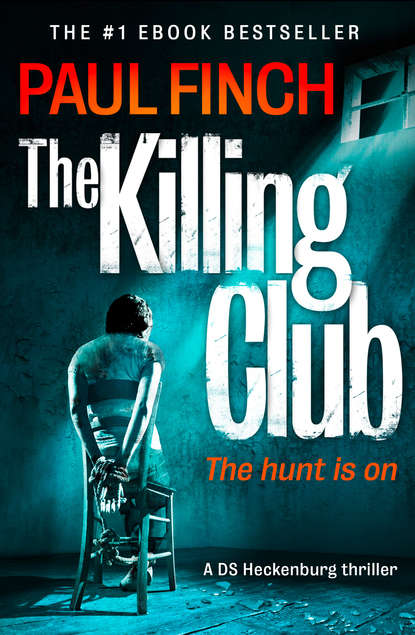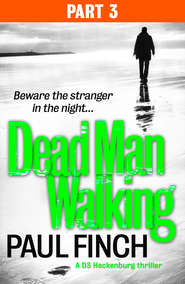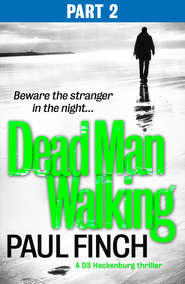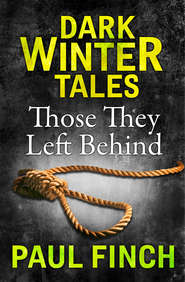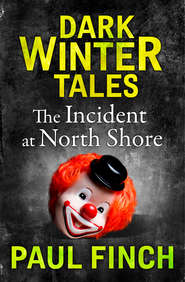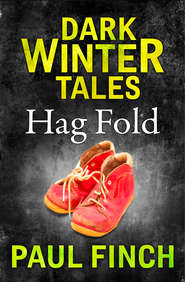По всем вопросам обращайтесь на: info@litportal.ru
(©) 2003-2025.
✖
The Killing Club
Автор
Год написания книги
2019
Настройки чтения
Размер шрифта
Высота строк
Поля
‘Good.’ Heck put his shoulder to the rear door, and it crashed inward, its rusted lock flying off with the first impact. Inside, the house stood in sepulchral dimness.
‘Mr Cooper, it’s the police!’ Farthing called as they shuffled through a narrow scullery into a small, tidy kitchen. ‘We have a warrant to search these premises!’
There was no reply, but Heck glanced around. ‘Place is immaculate,’ he observed.
‘He’s always a well-turned-out bloke.’
‘Bit like a soldier, eh?’
In the hall, a shoe rack stood close to the door, on which Heck noted two pairs of muddy trainers. A raincoat was draped over the foot of the banister. Aside from these mundane items, this part of the house also looked neat. Its linoleum floor shone, as if mopped regularly. But the real surprise came when they moved sideways into the lounge, which in the past had been knocked through into the dining room to create one large living space, the walls of which had since been completely covered with sepia-toned news cuttings.
Fascinated, Heck’s attention flitted from one headline to the next.
Soviets launch winter offensive
British triumph in desert battle
As he’d heard in the station canteen, this was World War Two. Every aspect of it. But it wasn’t like a temporary display. The thousands of carefully interlocked cuttings here had literally been turned into wallpaper, incorporated into the fabric of the house’s interior. And it was a professional job; there wasn’t a square inch of plasterboard exposed. Heck glanced into what had once been the dining room.
Mussolini snatched from mountain redoubt
Royal Navy enters Pacific
Grainy images had been mounted to create maximum impact: frostbitten German troops surrendering in Russia; British tanks rolling over the sunburned plains of Alamein; U-boat survivors bobbing like driftwood in an oil-filled sea.
In addition, there were four framed black and white snapshots on the mantelpiece, each one depicting the same toothily grinning face: a young squaddie, usually with tousled hair and dust on his cheeks. In one, he’d been photographed in what looked like a desert graveyard, and had a small mongrel dog sitting on his left shoulder. In another he was hefting a Bren gun.
‘I’ve heard about living in the past,’ Heck said. ‘But this …’
‘Fuck!’ Farthing interrupted. ‘The knife’s gone.’
He was standing by the lounge sideboard, where other items of memorabilia were arranged. Two of these were cruciform medals done in black metal with white edging, attached to black, white and red ribbons – Heck recognised them as Iron Crosses, second class. In a glass case on the wall there was a faded red beret, with a silver badge attachment depicting an eagle clutching crossed daggers. Also fixed on the wall, as Farthing now indicated, there was a bent wooden scabbard, bound with black leather and clad at its sharpened tip with slivers of plate metal.
Heck didn’t need to be an expert to recognise the sheath for a khukuri. Though the knife itself was absent, its two smaller cousins – the chakmak and karda, utilised for sharpening the main blade, were still in place.
‘He might just have taken it to get it cleaned, or something,’ Farthing said.
‘That in itself would be a tad suspicious, don’t you think?’
Before Farthing could reply, a shudder passed through the house, and then another, and another. Heavy feet were descending the stairs, and at speed. Heck and Farthing both lurched to the lounge door at the same time, briefly hampering each other. When they finally burst into the hall, they caught a fleeting glimpse of a tall shape in a fawn tracksuit vanishing out through the front door, slamming it closed behind him. Heck reached the door first, but was briefly foxed by its special security lock. He twisted and turned the handle and hit the button repeatedly, all without consequence.
‘Here,’ Farthing said, pushing past.
He managed to get the door open, and they blundered outside.
The street was empty again, but two things struck them simultaneously: the front nearside tyre of the police Astra had been slashed to the ply-cord – as though someone had dealt it a passing blow with a heavy blade; and the gate in the fence opposite was now open and swinging.
‘Shit!’ Farthing shouted, heading across the road to his car.
‘What’s on the other side of that fence?’ Heck replied, going for the gate.
Farthing was now busy filching his radio from its harness. ‘What … oh, wasteland. Industrial wasteland …’
‘Can you get the car round there?’
‘Not without changing the tyre, obviously …’
‘Sod the bleeding tyre!’ Heck ran through the gate. ‘And get us some support!’
On the other side, a beaten earth path wove crazily down a shallow slope, looping between dense stands of Indian Balsam, their September seedpods now loaded to capacity and exploding as Heck barged against them. The path unfurled ahead of him for dozens of yards, but there was no sign of Cooper, which was disconcerting, given that he was in his fifties. Though what was it they’d said about him – that he’d formerly been an athlete? Heck swore under his breath. He’d known fitness fanatic coppers who were still ripped and energetic in their mid-sixties.
He fished his own radio from his pocket as he circled a thicket of hogweed and found himself following a rusty wrought-iron fence. Thirty yards ahead, there was a gap in this; on the other side of that, a muddy lane led beneath a dripping black railway arch. Heck kept running, doing his damnedest not to slip and slide in his leather lace-up shoes.
‘Alpha-Echo control from DS Heckenburg, Operation Bulldog, over?’
‘DS Heckenburg?’
‘I’m pursuing a suspect in the neo-Nazi murders. I could use some back-up, and some geographical guidance, over?’
It was several seconds before he received a response, which was no surprise as the passage under the arch ran forty yards at least. When he re-emerged into the open, Heck found himself on a dirt track strewn with bricks and twists of wire, which led past a broken-down gate onto the forecourt of a nondescript derelict building.
‘Excuse me, sarge … can you confirm that you’re pursuing a suspect in the Hendon murders, over?’
‘That’s affirmative. His name is Ernest Cooper, male IC1, tall, six-two or six-three, late fifties, over.’
‘Whereabouts are you, over?’
‘That’s the problem. I don’t bloody know.’ Heck could have beaten himself up at that moment. He hadn’t even memorised Ernest Cooper’s address, and he’d dropped the warrant back in the house, so he had no point of reference at all. All he knew was that he was somewhere in Sunderland’s East End.
‘Can you contact PC Jerry Farthing?’ Heck hadn’t memorised Farthing’s collar number either, which was another black mark against him. ‘He’ll tell you where we are, over.’
‘Affirmative. Stand by.’
‘I can hardly stand by,’ Heck said under his breath, as he jogged through the gate onto a broad, cindery parking area. About thirty yards ahead, the scabrous edifice of the main building was visible. Its upper windows were yawning cavities. A protruding lattice of rusted metalwork ran along the front, about fifteen feet up; the relic of a canopy, beneath which wagons would have idled. Fragments of mildewed signage remained, but were unreadable.
Heck hesitated to go further. Was it feasible that Cooper, fit as he was, could have got this far ahead? The problem was there didn’t seem to have been anywhere else he could run to. It was all a bit worrying, of course, because if Cooper was the perp, and it now seemed highly likely he was, there were only three reasons why he’d run like this: either there was somewhere else he could go, some bolthole where he could lie low; his personal liberty was less important to him than finishing off the work he’d set himself, eliminating Nathan Crabtree’s gang; or both of the above.
In no doubt that he needed to catch this guy right now, Heck advanced towards the building, scanning it for any identifying marks he could pass to Comms. Most of its ground-floor entrances were covered by wooden hoardings, but the most central one had collapsed, exposing black emptiness.
He stepped through this, ultra-warily.
Total darkness enclosed him – but only for a second. Very rapidly, dimmer light sources became apparent, and his eyes attuned to an area that was like a small lobby, half-flooded with water, crammed with broken bricks and masonry. Anyone attempting to dash through here would likely have fractured an ankle. Instead, Heck tip-toed through it, balancing on planks and fallen joists. A secondary door led into a cavernous inner chamber, the entrance to which was only accessible at the end of sixty yards of cage-like corridor, lagging and bits of cable hanging down through its mesh ceiling.
Again, Heck halted. Going further on his own was asking for trouble. Cooper had the khukuri knife – and he was clearly a dab hand at using it. With a single blow, he’d disabled a police car. Speaking of which – Heck gritted his teeth with fury at Jerry Farthing. Any bobby with his experience ought to have known that checking damage to a company vehicle was of less importance than apprehending a suspect. In fact, he would have known it. The reason Jerry had refused to join the chase was a lack of motivation. Whether that was down to fear or laziness, Heck wasn’t entirely sure, but the bastard was clearly past his best.
Then, to his surprise, he heard the chugging of an engine outside.
He scrambled back through the brick-strewn lobby, and felt a vague pang of guilt at the sight of Farthing’s Astra wallowing to an unsteady halt on the forecourt, its front nearside tyre hanging in ribbons. He walked quickly over there. ‘Have you put Comms in the picture? I wasn’t able to …’ His words petered out.





